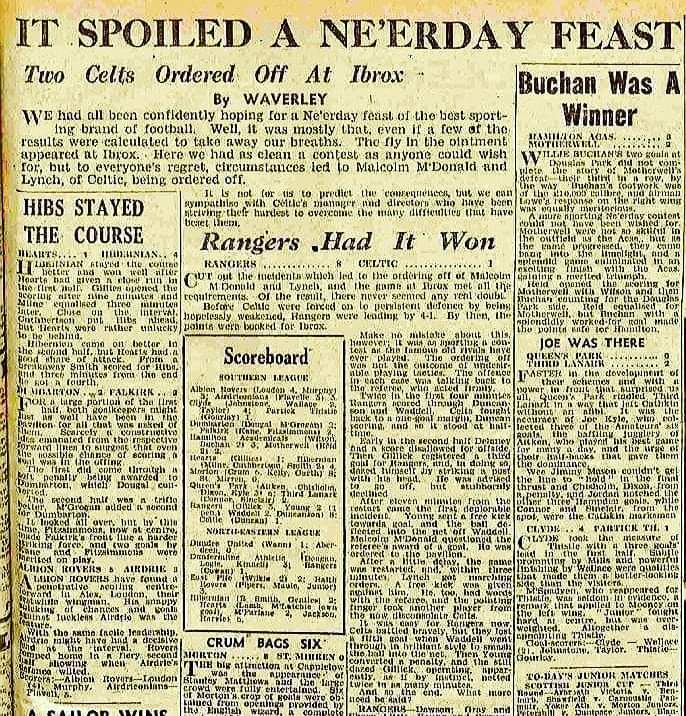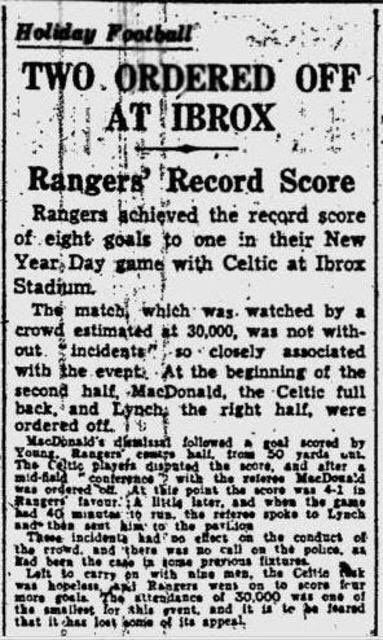Match Pictures | Matches: 1942 – 1943 | 1942-43 Pics
Trivia
- Celtic & World War Two
- Rangers biggest ever victory over Celtic, although as it was wartime in the truncated League Souther Division, this is NOT classed as an official fixture, but still humiliating for the then Celtic team.
- New year’s day derby match.
- Newspaper reports suggested that Celtic’s Malky McDonald was convinced that a Rangers player was offside at the moment Young unleashed his shot. The official in charge took exception to the tone of McDonald’s argument and sent him off. Appearing later before the Scottish FA, McDonald was fined £10 and suspended for the remainder of the season. Matt Lynch, having continued to protest, was also sent off, fined £5 and banned until March.
- January 27 – For offences in New Year game, MacDonald suspended for the rest of the season, and Lynch until March 27. Difficult to convince Celtic supporters that SFA is not anti-Celtic
- A Celtic supporter bought the ball from the 1-8 game at the New Year for £50! Money went to Stalingrad Relief Fund.
Review
Celtic’s darkest day (arguably), but there were extenuating circumstances in the draconian sending off of MacDonald and Lynch, and the injury to Willie Miller.
Teams
Rangers:
Dawson, Gray and Shaw; Little, Young and Symon; Waddell, Duncanson, Gillick, Venters and Johnstone
Goals: Waddell 3, Gillick 3, Duncanson, Young pen
Celtic:
Miller, MacDonald and Dornan; Lynch, Corbett and Paterson; Delaney, McAuley, Airlie, McGowan and Duncan
Goals: Duncan
Referee:Mr W Davidson, Glasgow
Attendance: 30000
Articles
- Match Report (see end of page below)
Pictures
Links
Articles


Flashback: Rangers trounce Celtic in New Year’s Day Old Firm in wartime fixture that time forgot
Rangers’s biggest ever defeat of Celtic came on Jan 1, 1943
By Jon Culley
9:04PM GMT 31 Dec 2013
The Telegraph
Rangers 8 Celtic 1, Jan 1, 1943
Once upon a time, before Rangers fell upon troubled times and before the authorities decided that the behavioural excesses of some rival fans could no longer be tolerated, the New Year edition of the Old Firm derby was as much a Scottish tradition as Hogmanay itself.
Great New Year’s Day victories illuminate the annals of both clubs. Five of Celtic’s most resounding Old Firm wins and six of their heaviest defeats have taken place on Jan 1, although the one that many Rangers supporters feel should take pride of place does not appear.
Officially, the largest margin of victory in matches between the Glasgow clubs was achieved on October 19, 1957, in the final of the Scottish League Cup, when Celtic shocked the reigning Scottish League champions and short-odds favourites by producing an irresistible display of attacking football at Hampden Park that resulted in a 7-1 win.
Yet on Jan 1, 1943, Rangers had gone one better than that, trouncing their rivals from across town 8-1. The Rangers team featured some famous names from the club’s history, including Scott Symons, who would lead Rangers as manager to six League titles and five Scottish Cups, Willie Waddell, who would serve the club with distinction as player, manager and director over a 50-year career, and Dougie Gray, the club’s longest serving player.
The reason for its absence from the record books? The clue is in the date: it took place in wartime, when football continued to provide entertainment for the masses and a distraction from the anxiety and austerity of daily life, yet for various reasons, not least because teams often had to use ‘guest’ players to make up the numbers, was deemed to have no official status.
Unofficial it might have been, uncompetitive it was not. As Glasgow stirred the morning after that particular Hogmanay, having ushered in a new year of uncertain fate, the lure of the Old Firm was strong enough to attract a crowd of 30,000 to Ibrox – restrictions were in place on the size of public gatherings – and the intensity of feeling on the field was such that two Celtic players were sent off.
As is noted in the Official Biography of Rangers, written by Ronnie Esplin and Graham Walker: “The game featured the usual controversies. Indiscipline and harassment of the referee resulted in Celtic having two players sent off following George Young’s spectacular 50-yard free kick that gave Rangers a 4-1 lead in the second half.”
Newspaper reports suggested that Celtic’s Malky McDonald was convinced that a Rangers player was offside at the moment Young unleashed his shot. The official in charge took exception to the tone of McDonald’s argument and sent him off. Appearing later before the Scottish FA, McDonald was fined £10 and suspended for the remainder of the season. Matt Lynch, having continued to protest, was also sent off, fined £5 and banned until March.
In front by 4-1 and with Celtic obliged to play for most of the second half with nine men, Rangers took full advantage. Torry Gillick finished with a hat-trick, with Waddell bagging two and Young adding a penalty to his long-range effort. Jimmy Duncanson, who had given Rangers an early lead, was the other name on the scoresheet, along with Celtic’s Davie Duncan.
The final margin may have been unusual but the notion that the result was a freak, skewed by the circumstances of wartime, does not really stand close scrutiny, according to Robert McElroy, author of several books on Rangers history.
“Celtic had won the Scottish title in 1938 but that team had grown old together and they were in a bit of a slump,” he said. “But that continued following the peace in 1945, after which it was six years before they won another trophy, nine years before they would regain the championship.
“They refused to use guest players – they even turned down an offer from Matt Busby to play for them – but though Rangers did field guest players, the only one in the 1943 line-up was Torry Gillick, who had left Ibrox to join Everton in 1939 but rejoined Rangers after the war.”
David Mason, the official Rangers historian, believes the game should be afforded the same status as any in the history of the Old Firm. “In wartime football the leagues had to be reorganised and some players were unavailable,” he said. “However, it was a competitive league and should have been recognised as ‘official’ for that simple reason.
“The match was of huge interest and the competitiveness of the fixture is clear by Celtic losing two men through brushes with the referee. There is no question that both teams wanted to win that match and there is no suggestion that either was weakened.
“Certainly, the Glasgow Herald proclaimed it to be a ‘record’ scoreline and, while I can imagine that some would like to airbrush it from history, that is how it is regarded, certainly at Ibrox.”